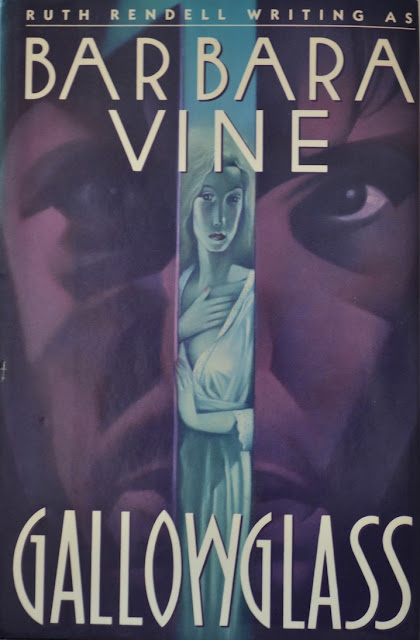 |
| Gallowglass - Barbara Vine (Ruth Rendell), Harmony Books, 1990 - 1st American edition |
If you check out my book shelf, you will always find, amongst the read copies, an unread Rendell / Vine, ready to be consumed when I am in the mood for another dose of her very special brand of psychological suspense. Luckily, Ruth Rendell, who sadly died in 2015, was a prolific writer and I am thankfully not going to run out of titles any time soon. Many of the titles I have read, I would class as favourite reads, including The Killing Doll, Lake of Darkness, One Across Two Down and the Tree of Hands.
Numerous of Rendell's plots and motifs stayed with me a long time after reading. Despite having read her novel Grasshopper many, many years ago, I still habitually think of this book and its roof-climbing protagonists, gazing at the rows of terraced houses from the train when I am travelling into London. I can therefore safely say that Rendell's fiction and her style of writing have made a long-lasting impression on me. I am by no means saying that all of her titles are ground-breaking works of fiction. Nevertheless, as far as entertainment is concerned, I have thus far never come across a major let-down.
Unfortunately, apart from delivering an unexpected twist at the end of the plot, a let-down is what Gallowglass was, at least in my opinion. As a consequence it took me around twelve months to finish this book. I stopped reading two thirds into the novel last November. Around the same time I discovered the BBC mini-series, which I (BIG MISTAKE!) finished watching before completing the book. (For all those interested: The BBC TV adaptation closely follows the book and I would not hesitate recommending it to all those wishing to avoid reading the book.)
It comes as no surprise that watching the TV adaptation caused me to completely lose my motivation to finish reading Gallowglass until I forced myself through the remaining 75 pages last weekend. Had the book not been written by one of my favourite authors, I might have relegated it back onto the shelf half-read.
There are several problems with Gallowglass and whilst I cannot really put my finger on it, here are the two main reasons why I only moderately enjoyed this book:
- The perspective / tone of voice:
I cannot think of any examples of Rendell / Vine books, in which the author has chosen to tell the story from a character's perspective. Gallowglass, however, is in parts (around half of the chapters) told from the perspective of Little Joe, one of the story's main protagonists. The remainder of the book is narrated from the perspective of a third person narrator.
In the chapters told from Little Joe's point of view Vine / Rendell naturally adapts her style and language to suit the character's linguistic abilities. Given Little Joe's background, these abilities are limited, which is reflected in his tone of voice, the conclusions he draws and the observations he makes. If you appreciate Rendell's succinct, elegant and detached mode of storytelling and prose, please be advised that you will not get this for very long stretches of this novel. Whilst reading, I could literally feel that I was trying to read through Little Joe's account of the story quickly, in order to get to the next chapter and be reunited with the third person narrator.
- Contrived plot / inconsistencies:
In Gallowglass Rendell / Vine keeps the plot moving at a steady pace, whilst managing to provide accounts of historic events, the characters' backgrounds and motivations. Nevertheless, I felt that the novel was full of incongruities. Why, for example, security magnate Apsoland would employ an ex-teacher (Garnet) without a professional background in security to provide chauffeur services and ensure the personal protection of his wife Nina, aka the Princess, eludes me.
This point of criticism comes to bear later in the novel as well. Yet, for the sake of keeping this review spoiler-free, let's just say that Apsoland's employee selection and screening processes seem to lack depth. Given Apsoland's profession and stated obsession with security, this was one of the many preposterous elements of the plot and an inconsistency that continued to jar with me until the end, for it is both unbelievable and completely unrealistic, but was also a necessary element to achieve a coherent, albeit contrived, story and the all-important surprise twist at the end.
Sadly, for these reasons I simply did not enjoy the book as much as I would have liked. Gallowglass, however, does not reflect the quality of Rendell's / Vine's other output and luckily for me, there are many more Rendell / Vine novels to discover. Even though Gallowglass did not convince me, having just started (actually almost finished) The Bridesmaid, Rendell will certainly not lose me as a constant reader.

